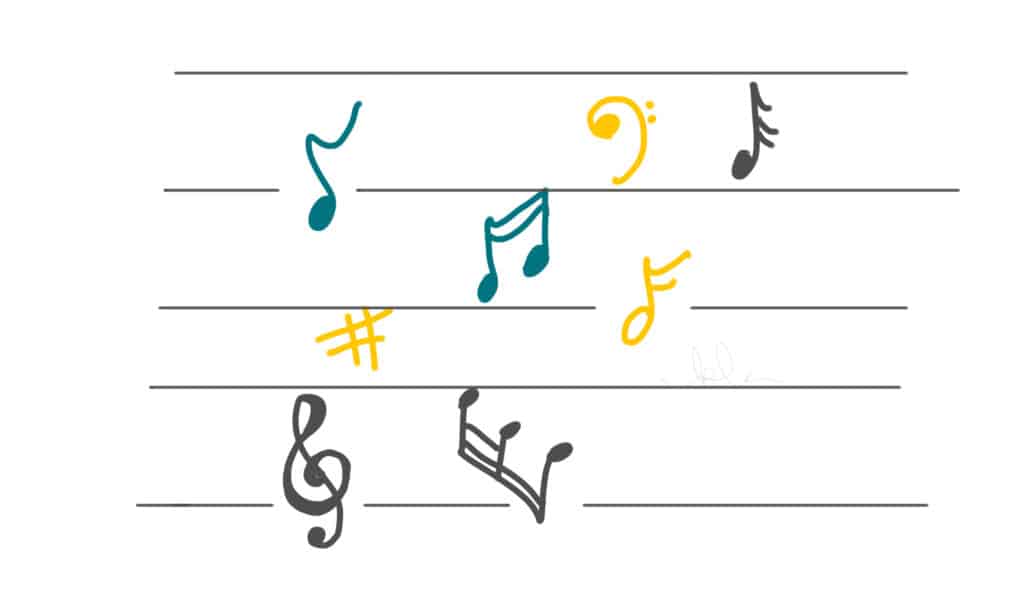`
I was once asked to help teach a group of young people about singing in harmony.
I wasn’t sure I was the best person to do this. Although I grew up singing at home and in church, and in small groups or choirs, it was all self taught – or rather, learned from listening to my mother.
My mum would continually hum or whistle as she went about her work (still does!). She had a habit of harmonising even as she did so. I’d be following the tune, nodding along or even humming myself, and realise she’d added a little trill or was going a different direction than I expected. I still knew the song, but something was different.
So when I stood in front of twenty or thirty young people to explain harmony to them, I didn’t do it the way a music teacher would – I don’t even know what that would look like. I simply explained it the way I understood it. I showed them the music notes, and hummed them aloud, and showed how when the note went up, the voice went up, and when the note when down the voice went down. All fairly reasonable, everyone got that. We all hummed and sang the core melody.
Then I explained the other three parts – the tenor, the alto, the bass. I showed them how each of those parts had different notes, but they worked together with the melody. When everyone else was following the notes going up, those singing alto might be going down, or just slightly different. We sang the alto part all on its own, like its own little song. Then the other parts, and then finally all four parts sang their individual songs, but together….and it sounded beautiful. The differing notes complemented each other.
The kids got the concept pretty well, and I had help from a few other teachers who enjoyed singing. This little group sang the melody, and that one sang the alto part, and those the bass, and you could hear the harmony.
Afterwards, one of the teachers came up to me to say how much she’d enjoyed the session. She shared with me that in thirty years of singing she’d never realised that the other parts – alto, tenor, bass – actually had different notes.
“I thought they were the same notes, just higher or lower,” she said. “I thought the melody was the same but the bass part sang it at a lower pitch. I never realised it’s four entirely different songs, if you separate them out.”
This concept of harmony is what you want in your team, in your business, far more than “unity”.
Unity is often misunderstood in the same way the teacher thought it meant “all the same notes, but these ones higher and these ones lower”. As if everyone thinks the same, does the same thing. As if we are “one”. Everyone toes the party line, follows the same path. This team member does what that team member does: it’s just that one of them has been with the company longer.
In harmony, we actually have different notes. Different little songs in each part of the business.
We need this team member’s note, and that one, and mine; and if we all sang or played the same note it wouldn’t be as beautiful, as varied.
Our clients affect the harmony too.
If there is a discordant note, we hear it. There’s a jarring tone which throws off the whole song.
We don’t necessarily throw them out or command them to get in line: we need to understand what’s happening. Is it just that they are playing a broken violin? Do they not know the song? How can we help them?
And we seek to help them understand, to bring them into harmony, so we can all play beautifully together.
If after much effort they insist on the broken violin, or they want to sing an entirely different song, we might need to have a conversation about whether they’re in the right choir, in the right place. They’re not harmonising with the team, bringing out the beautiful music represented by so many different voices; they’ve picked another song entirely. Or made up their own.
Imagine a choir at Christmas singing “O Holy Night”, lofty and noble and light, and suddenly one person is (whether loudly or quietly) singing “Rudolph the Red Nosed Reindeer”. It doesn’t fit. They either need to stop singing, or learn the new song, or move to another choir.
Working with the right team, and clients, means harmony. We’re on the “same page” in the sense that we’re all in the same part of the song; but this team member is focused on project management and that one is thinking about strategy. Every email, every message, every meeting, every piece of feedback is a harmonised note, adding to the music the company is making.
My company has clear expressed values and pillars – things like creativity and generosity and rest. Taking responsibility, being gracious, staying positive, having an opinion. Our clients have their own expressed values. Community, and independence, and impact, and legacy. They’re different from ours; but they’re complementary as well. This client’s values are alto, and that client’s values are tenor, but all of them work with the PF melody.
If the values, the behaviours, the notes are not harmonious; if they’re playing their own song and it’s so wildly different from ours, the harmony gets broken.
Eventually we might say you know what, we appreciate the song you’re singing, but we’re going to ask you to play it over there, while we keep playing over here. Because we know our song and each other and this sounds good; this is the tune we want to bring to the world.
And we respect different songs. After all, the world needs classical music and rock music and bluegrass and country. (Some people might argue about whether the world needs country music but after all there are millions of people who want to hear those songs, and that’s the point!) You have every right to be part of a song, a choir, which is different and enjoy that. But if yours is so different than ours it’s throwing off the listener, that’s not harmony. It’s discordant.
Seek harmony in your team, with your clients in your business. And if you discover someone’s singing is “off”, do everything you can to help show them how their notes are affecting the others. Perhaps the note is you, at times. You’ve gotten off course or got excited or distracted, and it’s throwing off the beautiful music.
It’s often a very slight, very small adjustment, and you’re back on track. Singing in the way only you can, with the harmonious notes you contribute to the whole.
Is there a client or team member whose notes are a little ‘off’ recently? How might you help them?



